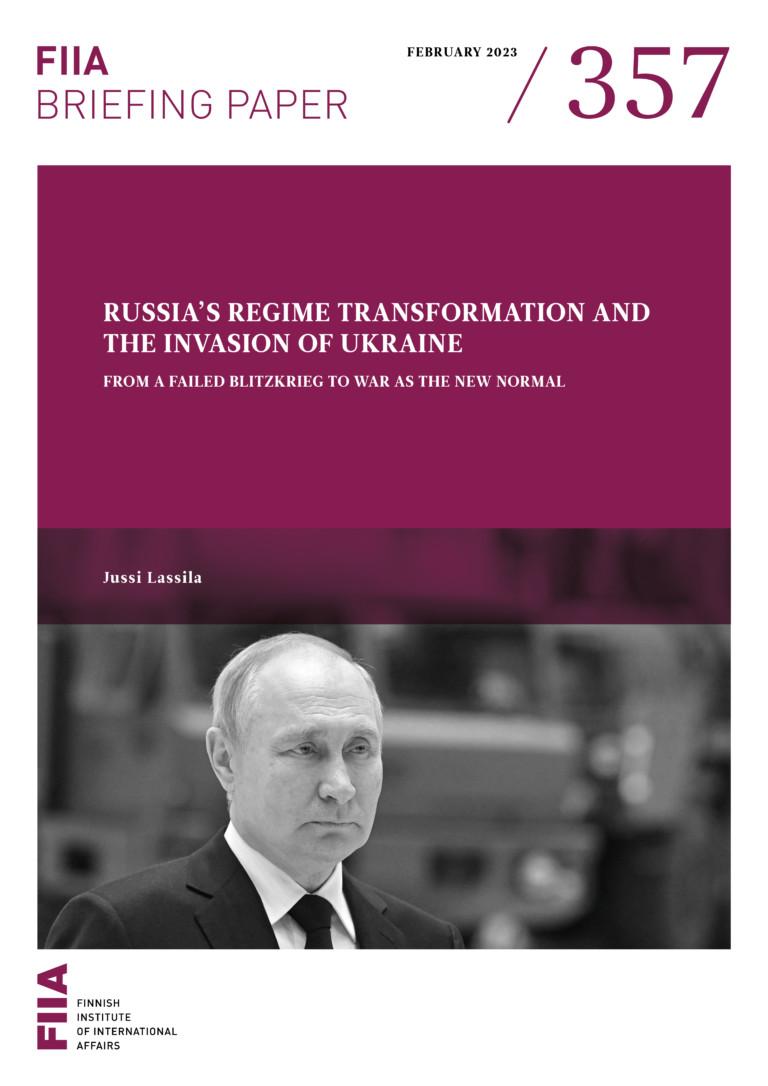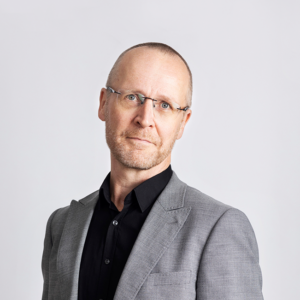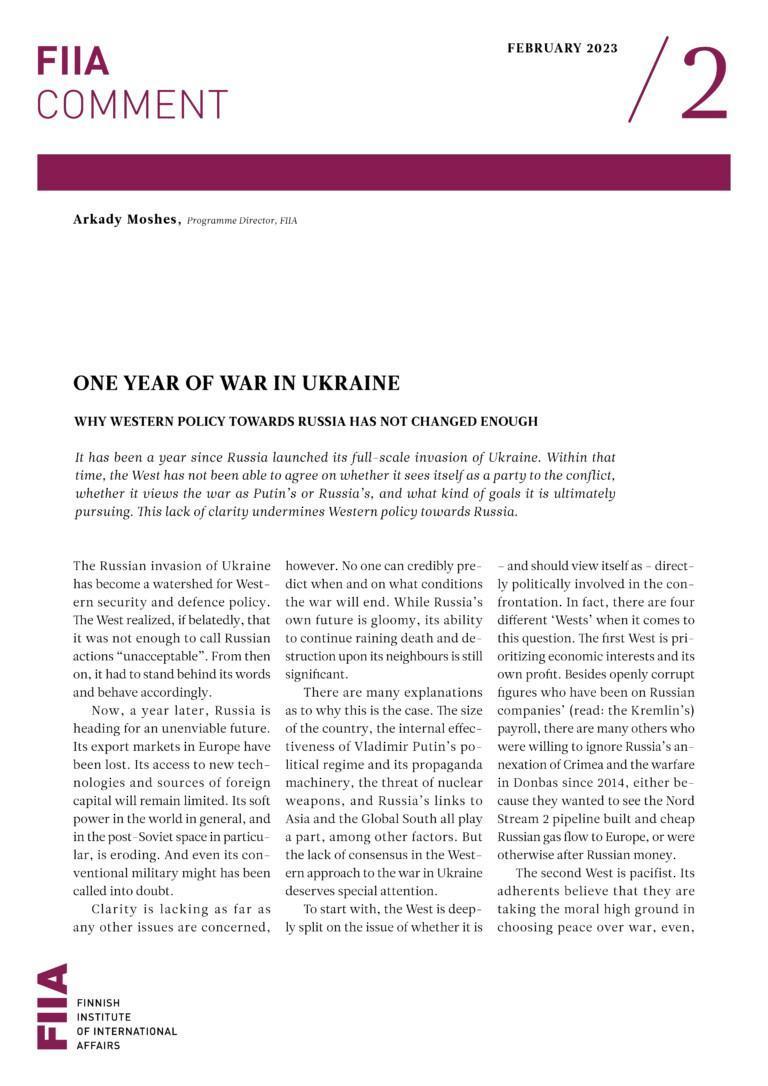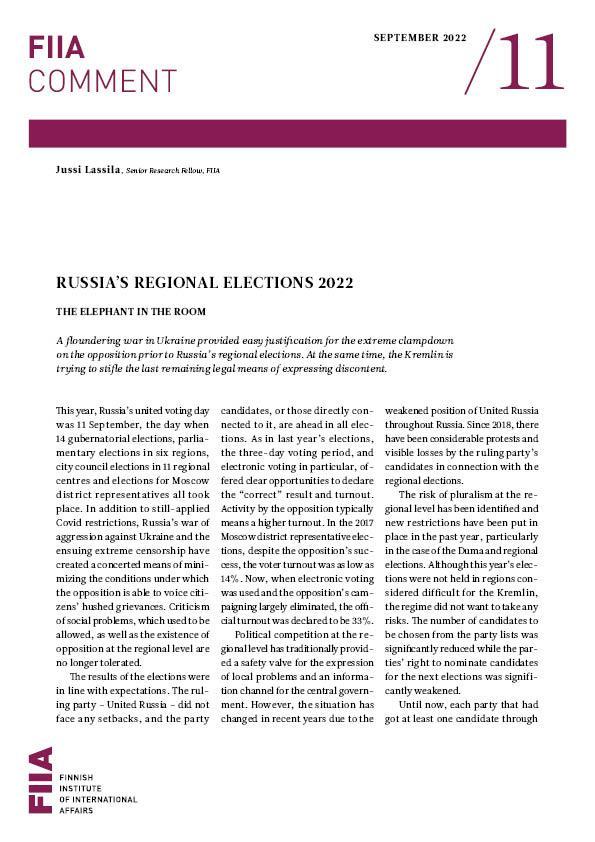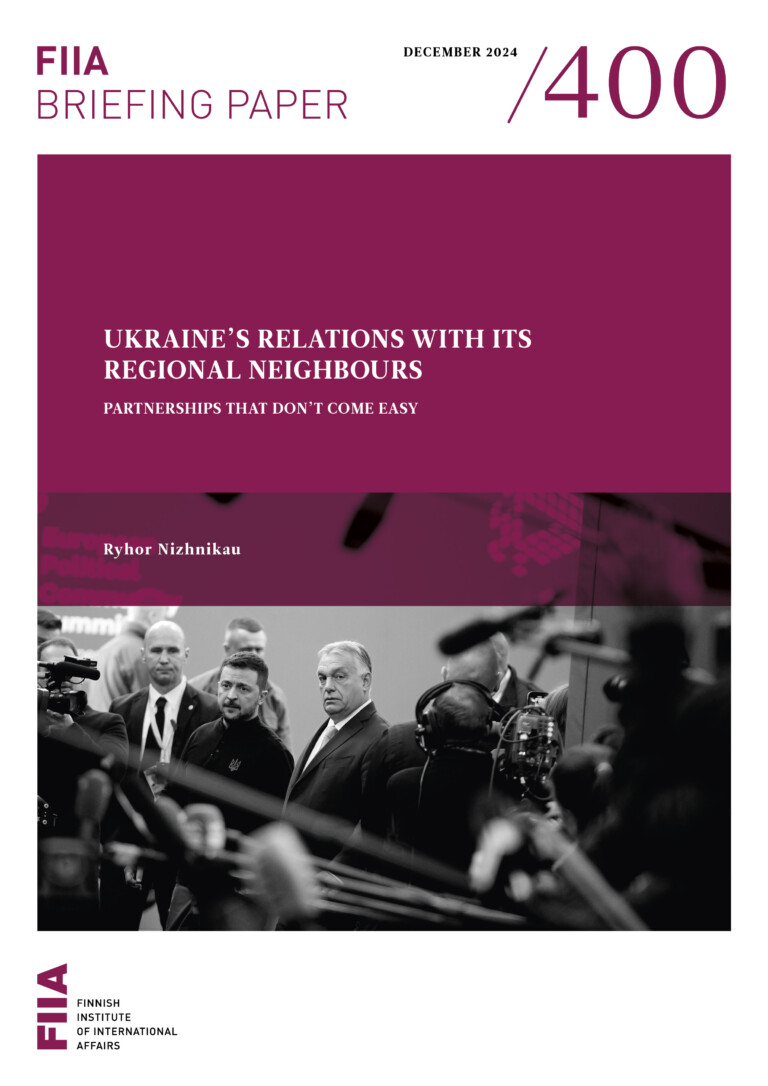Russia’s increasingly dictatorial and Soviet-nostalgic political leadership sees the invasion of Ukraine not only as a necessity when it comes to prevailing in the conflict with the West, but also as a chance to break free from Western influences.
Vladimir Putin is acting as a referee in the elite’s hidden competition, which has been transformed into open rivalry in the context of the war. The competition over who is the most loyal to Putin’s war policy radicalizes the political discourse throughout.
The Kremlin’s key challenge is to maintain the balance between citizens’ political apathy and the mobilization of society required in times of war. Civic passivity is central to the regime’s security, while justifying the continuation of the poorly progressing war requires an increasing militarization of society.
The Russian public’s approval of the war has gradually diminished, and efforts to mobilize society in revenge for perceived losses have not changed the trend. Hence, Russia’s poor military success is thus far the fastest way to vitiate the legitimacy of Putin’s war regime.
Introduction
There is little doubt that Russia’s war of aggression against Ukraine is the most significant political turn in Europe since the collapse of the Soviet Union. Globally, and especially in the former Soviet space, the ramifications of Vladimir Putin’s attack are likely to further weaken Russia’s influence. While it is rather obvious that Russia’s relations with the West will remain stagnant, at least as long as Putin stays in power, it is less clear how Russia will develop internally with the war failing to achieve its initial goals.
The foundations of Putin’s regime have endured waves of emigration of hundreds of thousands of educated citizens, the heaviest sanctions in modern history imposed by the West, the gradually increasing arms aid to Ukraine, and Russia’s largest human and material losses since the Second World War. Yet apart from individual visible cases, we have not seen large-scale defections from the elite or widespread protests.
However, the longer-term economic and political consequences of Putin’s decision to attack are clearly disastrous for the country. The cumulative costs of the war will certainly weaken the regime’s resources for sustaining and buying loyalty from the elite and the public, with the state’s role in the economy steadily expanding on account of the war. In terms of securing Putin’s position in power in the longer run, his dogged determination to press on with the war seemingly at any cost appears to be illogical at first glance. We do not know whether he feels compelled to save face, or harbours a deep-seated illusion about the successful progression of the “special operation”, or maybe both.
This Briefing Paper looks at how Putin’s authoritarian regime is transforming into a state where the war in Ukraine and the conflict with the West are becoming the basis of its legitimacy. The official discourse has become radicalized and tensions are appearing within the regime. First, the paper examines the regime’s practices prior to the war and the challenges it has faced, and then assesses how the invasion of Ukraine has changed the situation. After this, the radicalization of the official discourse and the tensions within the regime are evaluated before providing an overview of the dynamics of public opinion and societal commitment to the war. To conclude, the paper argues that both the regime’s consolidation around Putin’s war policy and public opinion are dependent upon Russia’s military successes. Nullifying the conditions for Russia’s successes on the battlefield duly remains the fastest way to weaken Putin’s war-based legitimacy.
Regime legitimacy in the guise of war
Central to Putin’s rule has been its way of instrumentalizing various administrative practices and ideological currents in securing its position and maximizing its control over primary economic assets, as has been documented in many patronal regimes.
The constitutional reform in 2020 was a prime example of what has been called ideational and structural improvisation; ad hoc manipulation of political rules and symbols to guarantee the regime’s survival in the near future.[1] Instead of introducing a completely new constitution – which would have been too tedious and too time-consuming considering the formal legal procedures of the Putin regime – we saw an ideological embellishment with conservative emphases, keeping the formal liberal and democratic principles of the 1993 constitution as the letter of the law, while securing the president’s position and exercise of power after 2024, which was obviously the main aim. The goal was reached at the expense of clear ideological cohesion.
It is possible to see the constitutional amendments as a tool for ensuring the internal security of the regime before preparing for the “great geopolitical manoeuvre”, namely the attack that started in February 2022. Putin may have also reckoned that a quick victory in Ukraine and the boost in legitimacy brought about by such a victory – as was the case in the annexation of Crimea in 2014 – would have been a secure way to ensure significantly better legitimacy for the extension of presidential terms than the “reset” of the constitution did in early 2020.
Retrospectively, the war can be seen as the culmination of Russia’s gradual regression from the previous “spin dictatorship”– namely a nuanced manipulation of democratic practices – into a traditional, increasingly repressive authoritarianism.[2] Essential to this change has been the weakened ability of an aging regime, increasingly resembling the late-Soviet one, to “spin” the changing society according to its interests in the modern information space.
Although the threat of colour revolutions has long been present in the Kremlin’s security policies, softer means are no longer seen as effective in combatting this threat. In particular, the activities of the domestic opposition are seen through the prism of the 2014 Ukrainian revolution and the 2020 uprising in Belarus.
Eventually, Putin’s deepening isolation as a result of the Covid-19 pandemic paved the way for the full-scale invasion of Ukraine as a final solution to the risk of colour revolutions conspired by the West, preceded by the widespread protests in Kazakhstan in January 2022.[3] As Putin has not backed down in his goals despite the failure of the blitzkrieg and the unprecedented costs that have ensued, it has become obvious that the war is being turned into a new foundation for the regime’s legitimacy. Given the regime’s gradual transition to increasingly repressive policies, continuing the war and making it a new normal is a safer option in the logic of the regime than ending the war without significant gains.
As the war drags on, Russia’s inexorable isolation from the West can be seen in a more profound return to Soviet-era practices. This is nothing new. For example, the debate about the content of patriotic education in schools between reformers, on the one hand, and older Soviet generations and ministries on the other, has been going on since the beginning of Putin’s rule. However, the ongoing war has not only provided an ideological anchor for the unimpeded return of Soviet-era practices, but the actual isolation is dragging society back to a past when Western connections were cut off.[4]
The Kremlin’s views on liberation from Western influences should be seen as being in line with the longer authoritarian developments culminating in the war, not solely as rhetorical cover-ups of defeats. The ambitions of the USSR-nostalgic political leadership are increasingly combined with the realities inflicted by the deepening isolation, while sufficient counterforces to a critical understanding of these realities are missing, not least due to the total repression of civil society. Moreover, even those who have not distinguished themselves as the fiercest anti-Western actors have increasingly sought to profile themselves in accordance with Putin’s expectations, such as First Deputy Chief of Staff of the Presidential Administration and the once liberally profiled Prime Minister from the late 1990s, Sergei Kiriyenko.[5]
Radicalization and competition for approval of Putin’s war policy
Besides the Russian state propaganda, the highest political elite, including Vladimir Putin himself, have started cultivating increasingly radical rhetoric as the war of aggression has dragged on. For example, in March 2022, Putin talked about eliminating the country’s internal enemies, comparing them to insects, and about the national need to “cleanse ourselves of these harmful substances”.
Repeated references to Ukraine posing an existential threat to Russia, and the framing of the war as a necessary civilizational clash with the West, are undeniably akin to fascist rhetoric. It is an open question, however, as to whether Putin’s regime can become truly fascist, as that would require a broad, bottom-up nationalist movement permitted by the regime, as well as a future-oriented revolutionary ideology. In contrast, Putin’s past-looking regime is afraid of any genuine civic participation and relies on a politically apathetic population.[6]
In any event, the rhetoric allowed and used by Putin has transformed the previous hawk-technocrat division between elite members into open rivalry in the context of the war. Now the competition is about who is the most loyal to Putin’s war policy, and this has radicalized the political discourse throughout.
Widely echoed expectations at the beginning of the war about technocrats and former liberals detaching themselves from the regime’s war front have turned out to be wrong. This may still happen as the problems deepen. So far, however, the war has not changed the foundations of Putin’s mafia-state rule. The most important issue is still dependence on Putin as patron and showing loyalty to him despite the dramatically changed circumstances.[7]
Tensions have appeared between members of the elite, however. In the past, loyalty shown to the president also meant loyalty to the unified image of the regime, despite mutual tensions among its members. Putin’s isolated autocracy, the elite’s uncertainty about the president’s intentions and the unclear outcome of the war have driven many members of the elite to highlight their positions.
Former president and former prime minister, and incumbent Deputy Chairman of the Security Council Dmitry Medvedev, who has descended into insane rhetoric, has attracted visible attention. His radicalization can be explained by his position related to national security, which he evidently interprets as a requirement to demonstrate obedience to the president and to signal his own importance to the rest of the elite.
Medvedev’s recent insinuations about the secondary nature of the law in punishing traitors in times of war prompted Federal Council Senator Andrei Klishas to defend the importance of the law. It is worth noting that Klishas has been the main authority in the making of repressive laws strengthening Putin’s dictatorial position in recent years. That is to say, Klishas’s talk in defence of the law should be seen as stemming from a need to defend his position as a central architect of Putin’s authoritarian legalism, rather than from a desire to uphold the rule of law as a counterpole to Medvedev’s vigilante views.[8]
A similar conflict emerged between Senator and Secretary of the General Council of the United Russia party Andrei Turchak and Duma Speaker Vyacheslav Volodin. Volodin criticized Turchak for being absent from Duma sessions and travelling to dangerous occupied territories, while Turchak claimed it was his patriotic duty and suggested that Volodin and the Duma were out of touch with reality.
Repeated accusations by Yevgeny Prigozhin, the authority behind the mercenary Wagner Group and numerous pro-Putin troll media outlets, against well-known Putin allies, like Minister of Defence Sergei Shoigu and St. Petersburg governor Alexander Beglov, have attracted considerable attention. Prigozhin is cut from the same ruthless cloth as Chechen dictator Ramzan Kadyrov. Both have demonstrated their loyalty to Putin by sending their subordinates to war, and the current situation offers an excellent opportunity to accentuate their position at the expense of the difficulties and incompetence of other players.[9]
In general, the fascist-like language used by certain members of the elite, and especially by the state propaganda – and embodied in the actions of Prigozhin and Kadyrov – is a result of the loyalty game played by Putin’s mafia state in the context of the war, adapting to it and exploiting it.
Between mobilization and withdrawal
Widespread approval of Putin and his policies notwithstanding, the Russian people have not been particularly enthusiastic about engaging personally with the war. By March–April 2022, after the major failure to take Kyiv, Russian support for the “special military operation” had already declined. The number of Russians who “definitely support Russian military actions in Ukraine” was 41% in December 2022, which is the hitherto lowest proportion (in March the figure was 52%). Moreover, state propaganda efforts to brainwash people into adopting a revenge mentality have proved to be partly counterproductive.[10]
In summer 2022, viewership of the three most important state television channels fell by more than 20%. The lack of willingness to contribute personally to the state’s war efforts became obvious in September when Putin launched a vaguely defined “partial mobilization”.[11]
The repressed civil society and the weak tradition of collective action in Russia are channelled either into emigration or into a deepening withdrawal from society, rather than into a strengthening belief in mass organization against the regime. The deepening retreat from everything related to politics is manifested in Russians’ diminishing willingness to answer all kinds of surveys, which was already low before the war. According to an independent pollster, since the beginning of the war, the number of refusals has increased by 25% and the rate of survey abandonment has increased by 34%, a third of which were abandoned when a direct question about support for the “special military operation” was posed. In total, the average rate of refusals has been approximately 88% during the war.[12]
The lack of active commitment to Putin’s war also applies to the political establishment. In February 2022, two days before the invasion, 50 Duma deputies out of 450 (of which 42 were from the United Russia party) were not present during the vote for the recognition of the independence of the Donetsk and Luhansk People’s Republics. Although not a single deputy abstained, let alone voted against, the number of absent deputies implies at least indifference to the official justification for launching the “special military operation”.
More importantly, on 3 October 2022, when the Duma ratified the annexation of four regions to Russia, approximately 40 deputies were absent during each of the votes for the regions. This is an even clearer indication of indifference (or hidden protest), since it can no longer be unclear to any deputy what the issue concerns. It is highly likely that during the February vote very few representatives (if any) were aware of Putin’s offensive intentions.
This passivity may be the reason why United Russia has announced that it will expel from the party those rank-and-file members who have not supported the war. This sends a clear message to the more influential members of the party. Simultaneously, the party is preparing for this year’s regional elections by nominating recent war veterans as candidates. Putin’s main party is thus trying to profile itself with credible candidates and party members against members of the systemic opposition loyal to Putin, who are hardly any less militant. This in turn suggests that the 2024 presidential election will revolve around the theme of war.[13]
Conclusions
The non-participation of citizens and the related weakness of political counterforces has been a central protective shield of Putin’s regime. It has also contributed to the consolidation of authoritarianism that led to the war of aggression and encouraged the regime to take ever more radical steps in the implementation of its policies if necessary. However, authoritarian rule tends to underestimate the changing expectations of citizens.
The regime’s interest lies in the war, the consequences of which are largely suffered by citizens in their everyday lives. While the majority of citizens prefer to retreat from the reality of war through non-commitment, the regime has a worsening problem on its hands. The shift towards a wider militarization of society accompanied by the hardships of the war will likely provoke the personal demobilization of citizens, as long as there are opportunities to do so.
It is uncertain what the public’s reaction will be when there is no further leeway for personal withdrawal. This uncertainty is the main reason why the regime, including its propaganda machinery,[14] is trying to avoid overly extensive war-mongering from time to time. Support for the war is still high, but the downward trend in support, especially in connection with visible losses, reveals society’s growing indifference to the war. It is obvious that Putin is hungry for quick victories to resolve this dilemma, and hence the fastest route to undermining his war-based legitimacy is to prevent these victories.
Endnotes
[1] Hale, Henry E. (2014) Patronal Politics. Eurasian Regime Dynamics in Comparative Perspective. Cambridge University Press; Hale, Henry E, Lipman, Maria & Petrov, Nikolay (2019) “Russia’s Regime-on-the-Move”, Russian Politics, 4(2), 168–195, https://doi.org/10.1163/2451-8921-00402002.
[2] Treisman, Daniel (2022) “The Reverse Evolution of A Spin Dictatorship”, RE:RUSSIA, 10 October 2022, https://re-russia.net/en/analytics/026/; Greene, Samuel (2022) “Why Putin fights”, TL;DRussia 29 July 2022, https://tldrussia.substack.com/p/why-putin-fights.
[3] Dettmer, Jamie (2022) “Putin: No More Color Revolutions”, Voice of America, 10 January 2022, https://www.voanews.com/a/putin-no-more-color-revolutions/6390636.html.
[4] Erozbek, Darʼya (2022) “Kravtsov dopustil, chto nachalʼnuiu voennuiu podgotovku v shkolakh mogut vesti uchastniki spetsoperatsii”, Kommersant, 19 January 2023, https://www.kommersant.ru/doc/5774604.
[5] “The Forever War”, RE: RUSSIA, 26 December 2022, https://re-russia.net/analytics/044/; Pertsev, Andrey (2022), “Kiriyenko’s War”, Riddle, 10 January 2023, https://ridl.io/kiriyenko-s-war/.
[6] Putin warns Russia against pro-Western “traitors” and scum, Reuters (16.3.2022), https://www.reuters.com/world/putin-warns-russia-against-pro-western-traitors-scum-2022-03-16/; Laruelle, Marlene (2022), “So, Is Russia Fascist Now? Labels and Policy Implications”, The Washington Quarterly, Volume 45, Issue 2, https://www.tandfonline.com/doi/full/10.1080/0163660X.2022.2090760.
[7] Magyar, Bálint & Madlovics, Bálint (eds.) (2020) The Anatomy of Post-Communist Regimes, CEU Press, https://library.oapen.org/handle/20.500.12657/46598.
[8] Orlova, Katya (2023) “Komandante Cho”, Novaya Gazeta, 9 January 2023, https://novayagazeta.eu/articles/2023/01/09/komandante-chio; Pertsev, Andrey (2023), “How the War in Ukraine Is Boosting Russian Politicians’ Careers”, Carnegie, 25 January 2022, https://carnegieendowment.org/politika/88874.
[9] Mukhin, Anton (2022) “Prigozhin vs. Petersburg Governor: What a Feud Reveals About Russia’s Power Vertical”, Carnegie, 6 December 2022, https://carnegieendowment.org/politika/88572.
[10] Konflikt s Ukrainoy: otsenki dekabrya 2022 goda, Levada tsentr, 23 December 2022, https://www.levada.ru/2022/12/23/konflikt-s-ukrainoj-otsenki-dekabrya-2022-goda/.
[11] “Auditoriya rossiyskikh telekanalov rezko sokratilas”, Meduza, 29 August 2022, https://meduza.io/episodes/2022/08/29/auditoriya-rossiyskih-telekanalov-rezko-sokratilas-lyudi-ustali-ot-propagandy-neuzheli-oni-budut-menshe-smotret-televizor.
[12] “V nachale voyny Putin sobiralsya kospleitʼ 1945 god. Teperʼ — 1941-y”, Meduza, 17 October 2022, https://meduza.io/feature/2022/10/17/v-nachale-voyny-putin-sobiralsya-kospleit-1945-god-teper-1941-y.
[13] Mukhametshina, Elena & Ivanov, Maksim (2023) “Vlasti vydvinut byvshikh uchastnikov spetsoperatsii na vybory”, Vedomosti, 12 January 2023, https://www.vedomosti.ru/politics/articles/2023/01/12/958736-vlasti-vidvinut-bivshih-uchastnikov-spetsoperatsii.
[14] Arkhangelski, Andrey (2023) “Small-Screen Predictions: Reading Russia Through Its Festive TV Shows”, Carnegie, 23 January 2023, https://carnegieendowment.org/politika/88855.
